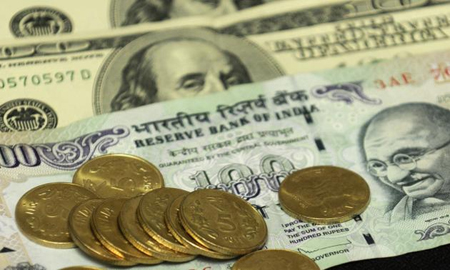
Mumbai, Aug 27: The BSE benchmark sensex was down by over 450 points in the late morning session on Monday on fresh selling pressure due to sharp fall in rupee value and lower global advices coupled with capital outflows by foreign funds.
Shares of banking, realty, PSU, metal, auto, refinery and capital goods sectors declined on heavy selling pressure.
The sensex resumed lower at 18,460.72 and dropped further to a low of 18,281.61 before quoting at 18,301.61 at 10.30am, showing a loss of 256.52 points, or 1.38 per cent, from its last close.
It was down 474 points at 11.45am.
The NSE 50-share Nifty also moved down by 81.75 points, or 1.49 per cent, to 5,394.75 at 10.30am.
The NSE was down 142 points at 11.45am.
Major losers were HDFC Bank (4.34 per cent), HDFC (4.19 per cent), M&M (2.55 per cent), ONGC (2.48 per cent), Coal India (2.47 per cent), Sun Pharma (2.24 per cent), Maruti Suzuki (2.17 per cent), Hindalco Ind (2.01 per cent), BHEL (1.82 per cent) and SBI (1.81 per cent).
Foreign institutional investors (FIIs) sold shares worth a net Rs 607.43 crore on Monday as per provisional data from the stock exchanges.
Asian stocks fell in early trade after US secretary of state John Kerry said the American president will hold Syria's government accountable for using chemical weapons against Syrian civilians. Key benchmark indices in China, Singapore, Taiwan, Hong Kong, Indonesia and Japan fell by 0.19 per cent to 1.92 per cent while South Korea's Kospi rose 0.29 per cent.
Rupee plunges further to 65.37
The rupee, meanwhile, continued its decline in the late morning session and was last trading at 65.37 against the dollar on heavy month-end dollar demand from importers amid sharp fall in domestic equity market.
The rupee resumed lower at 65.00 per dollar as against the last closing level of 64.30 at the Interbank Foreign Exchange (Forex) Market and dropped further to a low of 65.44 against the US currency before quoting at 65.37 per dollar at 10.40am, showing a loss of 107 paise or 1.66 per cent.
It moved in a range of 65.00 and 65.44 per dollar during the morning deals.
Persistent month-end dollar demand from importers mainly oil-refiners amid sustained foreign capital outflows from the equity market pulled down the rupee value, a forex dealer said.
In the global market, the US dollar slipped against the euro and the Japanese yen in their early trade as concerns about possible US military action against Syria added to existing uncertainty over Federal Reserve policy.





Comments
Add new comment